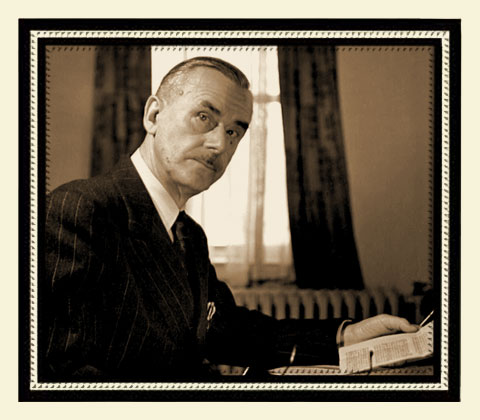Lübeck, Germany, 1875 — Zurich, Switzerland, 1955
Novelist, Nobel Prize for Literature
One of the greatest novelists of the 20th century, Thomas Mann was the son of a merchant from Lübeck and Julia da Silva Bruhns, who was born in Brazil and always had an important artistic influence on her two writer sons: Thomas and Heinrich. Thomas was still young when he gained fame with the family saga Buddenbrooks (1901), and in 1929 was awarded the Nobel Prize for Literature. He opposed Nazism and left Germany in 1933, settling in Switzerland and then in 1938 moving to the United States.
His relationship with Stefan Zweig was long, regular and unequal. Zweig idolized him, and Mann responded in his own way – courteous and distant. Their first contact took place in 1917, when Mann, sincerely touched by the dramatic anti-war poem Jeremias, wrote to the author describing it as “the most significant poetic fruit of this war”. Zweig sent him all his books, duly autographed, while Mann only sent him Lotte in Weimar, which was answered by an enthusiastic letter and later a review (included posthumously in the second collection of essays). “To the genius of responsibility” was a dedication published by Zweig in June 1925. Partners in various enterprises to pay tribute to figures such as Sigmund Freud, they were also both on the committee of Forum Bücher of Amsterdam, which published the works of German language authors banned by the Nazis.
Zweig’s support of and friendship with Klaus Mann may have made the latter’s father jealous. Donald Prater, the biographer of both, notes that privately Mann envied Zweig’s ability to work and his success as an author. He admired his humanist engagement, but not his gifts as a writer. Prater found in Mann a persistent insincerity when he praised authors in letters, while simultaneously abusing them in his diaries. This was the case with The Right to Heresy: Castellio against Calvin (of 1936), which privately he thought “uninteresting, second-rate as usual”, while in a letter to Zweig a few days later declared that “it’s been a long time since I’ve been so anxious to read a book, been so gripped by the material and its construction... congratulations”.
Zweig’s suicide was also figures on the list of incomprehension between the two writers. Mann read the first news and the initial version of the “Declaration”, with the suppressed ending. He wrote a laconic comment in the exile journal Aufbau, in which he praised the deceased’s humanity and goodness, but saw a greater tragedy in the fact that these attributes hadn’t been strong enough to enable him to await the break of day. In private, the “Magician” accused Zweig of cowardice and egotism, being unable to see the effect of his gesture on those who hoped to escape Hitler’s hell. Through Erika Mann, Thomas’s favourite child and her militant colleague in the Emergency Rescue Committee, Friderike found out about Mann’s thoughts and complained. Mann wrote respectfully to Friderike in an attempt to eliminate any misunderstanding. “Death is an argument which wins any controversy,” he concluded. In 1947 Mann returned to Germany and in 1952, on the tenth anniversary of Zweig’s death, he wrote a new text, this time without any misgivings, praising him as a great pacifist and humanist.
Thomas Mann lived in Switzerland until his death in 1955. He left behind a vast oeuvre, highlights among which are Death in Venice (1912), which explores themes of decadence and death, The Magic Mountain (1924), which deals with the break-up of European civilization, and Doctor Faustus (1947), the story of the unscrupulous musician Adrian Leverkühn, who, like Faust, sells his soul to the devil in order to achieve true greatness.
Address listed: none
